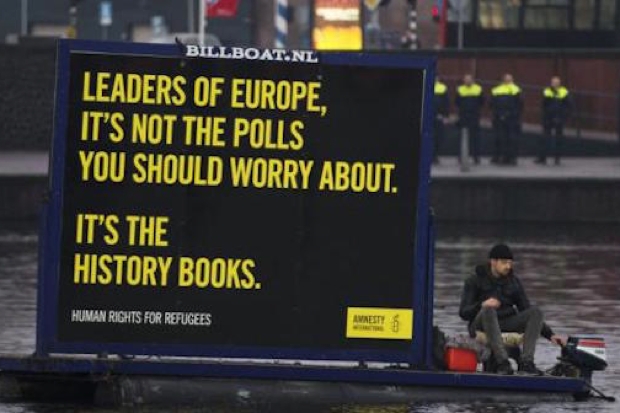If I was in charge of the Home Office I’d employ someone whose sole area of expertise was Hitler’s Germany and whose only job was to keep an eye out for any vague echoes of Nazism, however fatuous, in the working practices of the government or its contractors.
This would have avoided Monday’s controversy over asylum seekers being made to wear red wristbands in order to receive free meals, because being asked to wear ID to qualify for things is exactly like being a Jew in Hitler’s Germany. A chilling echo, as many people commented. I imagine the reason for this policy is that it’s more convenient than asking someone with a not especially good grasp of English to walk around with a form for his entire family; either that, or it was part of a concerted effort by the Conservative government to pave the way for the mass extermination of refugees.
As Julia Hartley-Brewer pointed out, ‘anyone who has ever been to a festival or all-day pop concert where they were required to wear a wristband or anyone who had to show their wristband to get free drinks and access to the all-you-can-eat buffet on their full-board holiday; they were all blissfully ignorant of the horrible crime being perpetuated against them’. But having said that, it was politically unwise, and my Nazi-Spad would have been able to spot the mistake beforehand.
I don’t doubt that life is pretty tough for the refugees, although I imagine it’s a lot more pleasant in Cardiff or Middlesbrough than it is being barrel-bombed by Assad. It’s a shame that asylum seekers are dumped in towns with high unemployment and little racial diversity when they’d clearly be happier in London where there are compatriots around, and indeed where most of the support for generous asylum policies comes from. But since pretty much every bedsit, garage and shop doorway in the capital now has someone living in it, I guess not much can be done about that.
On the same day as this story broke Amnesty International put out an advert in the New York Times calling on European leaders to take in more refugees. The picture showed families behind barbed wire with the phrase ‘Leaders of Europe, it’s not the polls you should worry about. It’s the history books.’
https://twitter.com/adhofstra/status/691665680450637824
Chilling, once again. Except for the fact that Germany’s policy right now is as far from Nazism as it is possible to get – pathological altruism rather than pathological nationalism – and yet the minute a refugee is photographed near barbed wire we’re immediately back to Auschwitz.
Next door to Germany sits tiny Denmark, which has historically been one of the most ethical countries on earth (at least since the time of Canute the Great). It has now been compared to the Nazis after it told refugees that they must sell their assets to pay for their upkeep before the Danes support them. I agree they should have exempted special items like wedding rings, but how tenuous is that Nazi comparison? As James Lewishon wrote for The Spectator:
‘The Nazis took the Jews’ valuables as part of an industrialised process of genocide which ended with them stripped naked and murdered in the showers of Auschwitz. The Danes meanwhile organised the most successful rescue of Jews anywhere – 92 per cent of Danish Jews survived the war, including my entire family. It is true that today the Danes are proposing to take some refugees’ valuables as part of the asylum process. But the showers at the other end are safe and contain hot water paid for by Denmark’s extensive welfare state.’
The problem with history is that the most dominant subjects tend to crowd out all others, just as in any artistic sphere the most celebrated musician, writer or artist tends to become remembered at the expense of contemporaries. This has happened with Nazi Germany in our culture, which has become ubiquitous just as knowledge of large areas of the past has become confined to a few enthusiasts.
I’d certainly agree with Amnesty that we would get better governance if our leaders read more history books. If they read widely, they would not see everything through the prism of the most extreme and well-known recent past. They would also be less inclined to base their policies on sentimentalism. So if Europe wanted a history lesson to guide it through the refugee crisis, the fall of Rome is a better one than Hitler’s Germany. It’s still debatable, but a much better historical comparison to start with.
One of the reasons for Nazism’s ubiquity is that this era of the past has become a weapon in the culture war, a stick with which to beat conservatism. Despite a spirited argument in some corners that Nazism was actually ‘left-wing’, it remains a useful warning case of what happens when conservatism goes too far and when patriotism in particular is turned towards evil ends: as Allan Bloom put it, Nazism was the right’s ‘ugly last gasp’.
Many people will argue that the whole point of teaching so much of Nazi Germany is to avoid a repeat of it. Yet the history books are full of warnings and lessons, so focusing on one area does not give us a well-rounded idea of the human experience, nor especially guide us away from future tragedy.
Last year 8,000 Jews fled France for Israel, and I can’t imagine it will be long before the Jewish population in Germany starts to decline once more. But because their tormentors don’t look like the people in our GCSE history books it won’t trigger any alarm bells. Amnesty is right: our leaders should worry about Europe’s history books, but maybe they should be more concerned about Edward Gibbon than William Shirer.







Comments